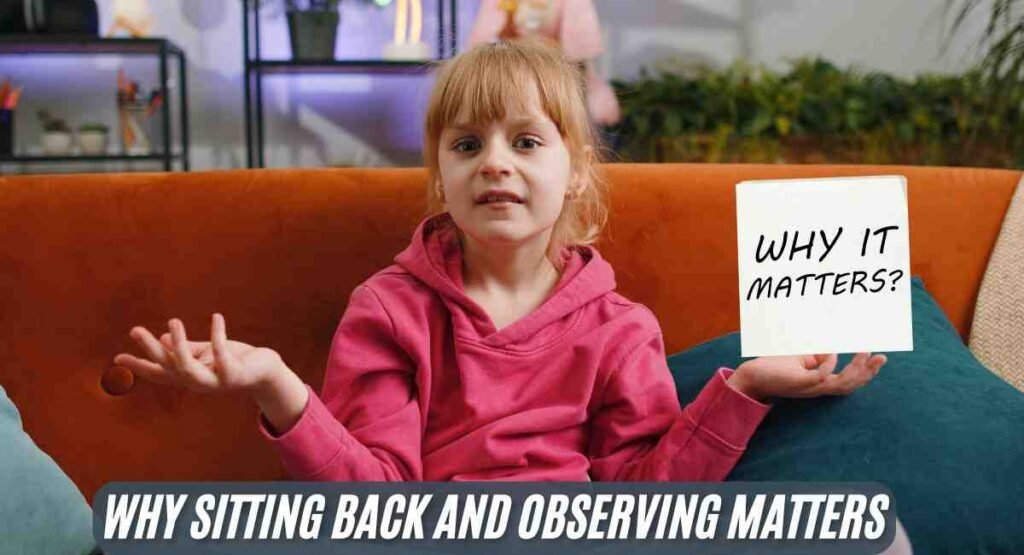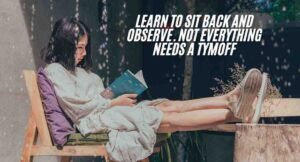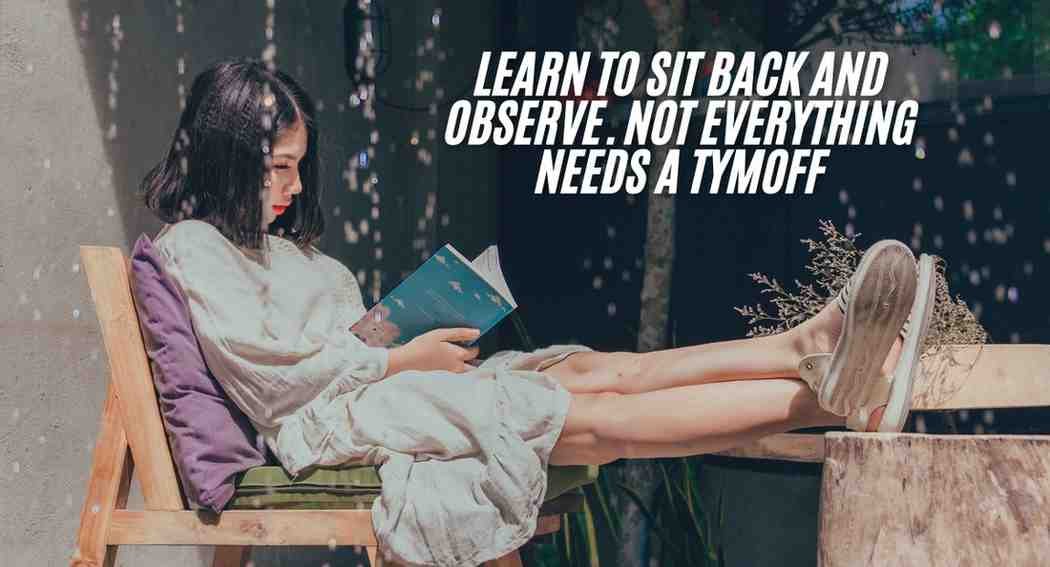In today’s fast-paced world, Learn to Sit Back and Observe. Not Everything Needs a TymOff we are often conditioned to react immediately to everything around us. Whether it’s work pressure, social obligations, or personal challenges, it can feel as though we must constantly be “on” — always doing something, responding to something, or managing the next task. In the middle of this constant hustle, the idea of Learn to Sit Back and Observe. Not Everything Needs a TymOff. seems almost foreign. Yet, it’s a practice that can bring profound benefits to our mental well-being, productivity, and overall life satisfaction.
Understanding the Concept of Sitting Back and Observing
“Sitting back and observing” TymOff refers to a mindset shift — one that encourages stepping back from active participation and instead focusing on simply observing what’s happening around you. It’s about creating space to reflect, pause, and understand, without the need to take immediate action or make judgments.
Many of us feel an overwhelming urge to solve problems as soon as they arise, act on every emotion we experience, or intervene in situations that may not concern us. However, not everything requires immediate attention or intervention. Sometimes, it is wiser to simply watch and reflect before jumping to conclusions or taking action. This can lead to better decision-making, reduced stress, and more thoughtful engagement with life’s challenges.
The Tymoff Philosophy
The Learn to Sit Back and Observe. Not Everything Needs a TymOff philosophy is about embracing the power of mindful observation rather than constant reaction. It encourages individuals to step back from the pressures of modern life, creating space to reflect, understand, and decide when action is truly necessary.
This philosophy TymOff promotes balance by recognizing that not every challenge or emotion requires immediate engagement. Sometimes, the most effective response is to simply sit back, observe, and allow situations to unfold naturally, rather than forcing intervention or solutions. By integrating Learn to Sit Back and Observe. Not Everything Needs a TymOff into daily life, we can cultivate a more thoughtful, calm, and intentional approach to the complexities we face.
Why Sitting Back and Observing Matters

1. Reduced Stress and Anxiety
The constant pressure to act immediately or solve every issue can create unnecessary stress. Learn to Sit Back and Observe. Not Everything Needs a TymOff you give yourself permission to pause, breathe, and approach situations with a clearer mind. This can reduce anxiety, allowing you to respond to problems from a place of calm and focus rather than from a state of stress or panic.
2. Better Decision-Making
Not every situation demands an immediate response. By taking a step back and observing, you gather more information, see patterns, and understand the bigger picture. This helps you make more informed decisions rather than reacting impulsively, which can often lead to regret or missed opportunities.
3. Enhanced Emotional Intelligence
When you sit back and observe, you practice patience and mindfulness. This practice enhances emotional intelligence by allowing you to understand not only your own emotions but also the emotions of others. It helps you become more empathetic and compassionate, as you can better appreciate different perspectives without rushing to judgment or offering unsolicited advice.
4. Improved Relationships
Sitting back and observing TymOff can also improve interpersonal relationships. Instead of feeling the need to fix every issue in a relationship or offer constant advice, sometimes the best thing you can do is listen and reflect. This can create a deeper connection, as it shows respect for the other person’s feelings and perspectives.
5. Cultivating Mindfulness and Presence
Sitting back and observing fosters mindfulness. When you practice observing without the urge to act, you are learning to live in the present moment. This mindfulness practice helps you focus on the now, rather than being overwhelmed by past regrets or future worries.
The Importance of TymOff: Not Every Moment Requires a Break

While taking Learn to Sit Back and Observe. Not Everything Needs a TymOff is important for mental health and well-being, it’s essential to differentiate between the need for rest and the need for active engagement. In the current climate, where burnout is a common issue, it can be tempting to think that taking a break is always the solution. However, sometimes the most powerful response is not stepping away from something, but rather adopting a different mindset and observation style.
Learn to Sit Back and Observe. Not Everything Needs a TymOff is valuable when it’s used for recharging and relaxation, but it should not become a routine avoidance mechanism. Not every stressful moment or challenging situation requires a break; some require us to simply step back, observe, and process before taking action. Here are a few situations where taking a break isn’t necessary:
- When You’re Feeling Overwhelmed at Work: Instead of immediately taking a time off, consider observing your workload and identifying tasks that may not need your attention right away. You might realize that you’re caught up in a cycle of unnecessary urgency, and by stepping back, you can prioritize more effectively.
- During Conflict or Disagreements: Whether it’s a disagreement with a colleague or a misunderstanding in a personal relationship, stepping back and observing the situation before reacting can be incredibly powerful. It helps you approach the situation with empathy and understand the motivations behind the conflict.
- When Emotions Are Running High: When we experience intense emotions, the natural impulse is to act on them immediately. However, observing these emotions from a distance without judgment can help you process them better and prevent rash decisions or reactions that might lead to regret later.
Also Read : 10.24.1.53 | CAT 2024 Slot 1 Exam Analysis | UploadArticle
The Advantages of Observing Without Reacting
- Reduced Stress: By taking a step back, you prevent knee-jerk reactions that often escalate stress levels.
- Better Decision-Making: Observing before reacting allows you to gather more information and make informed, thoughtful decisions.
- Improved Emotional Control: It helps you process emotions without acting impulsively, leading to greater emotional intelligence.
- Enhanced Relationships: Listening and observing without immediate responses fosters deeper understanding and stronger connections with others.
- Clarity and Perspective: Observing situations from a distance helps you gain a clearer, more objective view, avoiding biased or hasty judgments.
- Increased Patience: Practicing observation cultivates patience, which is essential for managing complex or stressful situations.
- Mindfulness: By being present in the moment without reacting, you strengthen mindfulness and learn to engage more consciously with life.
How to Practice Sitting Back and Observing
1. Develop Mindfulness
Mindfulness is the foundation of the “sit back and observe” TymOff mindset. Mindfulness involves paying attention to the present moment without judgment. To practice mindfulness, start with deep breathing exercises or guided meditation. Try focusing on your breath or sounds around you, without the need to intervene or control anything.
2. Shift Your Perspective
Instead of immediately jumping into action or offering a solution, shift your perspective to that of an observer. Imagine you’re watching a situation unfold as if you were an outsider. Take note of the various elements in play — the emotions, the actions, the reactions — without making any immediate decisions.
3. Pause Before Responding
Whether in conversation or at work, take a pause before you respond. This short moment of silence allows you to collect your thoughts, process the information, and respond thoughtfully. This prevents hasty decisions and allows you to avoid saying or doing things you might later regret.
4. Practice Detachment
Emotional detachment is a skill that helps you separate yourself from the immediate emotional impact of a situation. This doesn’t mean becoming apathetic; rather, it means observing your emotions and the situation without becoming consumed by them. You can still feel emotions, but you don’t need to react to them right away.
5. Embrace Reflection
Instead of rushing to act, embrace moments of reflection. Ask yourself questions like, “What’s really going on here?” “How does this situation align with my values?” or “What do I need to understand before I act?” This reflective practice helps you make more intentional and thoughtful decisions.
6. Limit Over-Scheduling
One way to create space for observing is by reducing your schedule. When your day is packed with constant activities and to-dos, it leaves little room for observation. Try to leave gaps in your day where you can simply be present in the moment, free from the pressure of the next thing to do.
7. Take Small Breaks, Not TymOff
Sometimes, all you need is a quick mental reset rather than a full break. Short pauses throughout your day, such as a 5-minute walk or simply stepping away from your desk, can help refresh your mind and allow you to come back with a clearer perspective.
Conclusion
In a world where everything seems urgent, the art of sitting back and observing is a powerful tool for maintaining mental balance, improving decision-making, and fostering deeper connections with those around us. By learning to step back, breathe, and take a pause, you can cultivate a more mindful, thoughtful approach to life’s challenges.
Remember, not everything needs immediate action or Learn to Sit Back and Observe TymOff. Not Everything Needs a TymOff Sometimes, the best thing you can do is observe, reflect, and then respond with clarity and purpose. So, the next time you’re overwhelmed or caught in the whirlwind of activity, try sitting back and observing the situation. You might be surprised at how much insight and peace you can find in simply being present.
Also Read : Free Anime Websites | Enviro Infra Engineers IPO | Angel:x5mw_4yijwo= Stitch
FAQs
What does “Tymoff” mean?
Tymoff is a concept that encourages taking time to pause and reflect rather than immediately reacting or taking a break. It suggests that not every situation requires time off or a quick response. Sometimes, simply observing and giving yourself space to process can be the most effective action.
How does sitting back and observing help with decision-making?
By pausing to observe, you gain a clearer perspective on a situation, allowing you to process emotions, gather more information, and avoid impulsive decisions. This approach leads to better decision-making, as you are more thoughtful and less reactive.
Is observing without reacting the same as avoiding problems?
No, observing without reacting is not about avoidance. It’s about creating space to assess the situation calmly and reflect on the best course of action. It allows you to engage more effectively, rather than jumping into a reaction that may not serve the situation or your well-being.
Can practicing Tymoff improve my relationships?
Yes, practicing Learn to Sit Back and Observe. Not Everything Needs a TymOff can enhance relationships by promoting active listening and empathy. Instead of rushing to solve problems or offer advice, taking a step back to observe shows respect for others’ feelings and perspectives, leading to stronger, more compassionate connections.
How can I incorporate Tymoff into my daily life?
You can start by creating moments of pause throughout your day, such as taking deep breaths before responding to stress or conflict. Practice mindfulness to stay present, and focus on observing your thoughts and emotions before reacting. By doing so, you’ll build the habit of reflecting rather than reacting impulsively.












